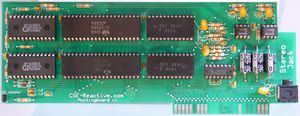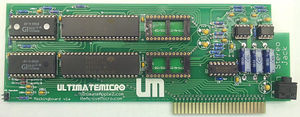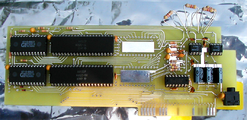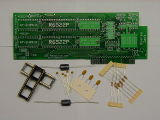Mockingboard
The Mockingboard is a 6 voice sound card for the Apple II/II+/IIe/IIgs designed originally by Sweet Micro Systems. In 2005 ReActiveMicro (then called GSE-Reactive) was the first company to reproduced a clone of the board called "Mockingboard v1".
Project Status: Complete. In production. Actively sold by ReActiveMicro. This project will be superseded by the Phasor project, then discontinued.
Support: Post on the Discussion page (link above) or email ReActiveMicro Support.
Sales: Visit the ReActiveMicro Store.
History
The Mockingboard v1 was the first project ReActiveMicro started with in September 2005. After a bit of market research there seemed be enough demand to warrant this project. The board itself also seemed like a good candidate since it was a simple design, 2 layer PCB, and used standard parts which were still easily sourceable. Henry then found the board on eBay and won the auction.
Henry had been discussing possible project ideas with Bill Garber. Bill offered to help show Henry how to use ExpressPCB CAD software, which is what most beginner hobbyists used back in early and mid 2000's.
Henry disassembled the board and noted what all the parts were. Bill was involved with starting the CAD layout, however he wasn't able to finish, so Henry took over and completed the project. Bill also helped with updating the design from an RCA Audio Cable to a 3.5mm Jack. He is also credited with the concept to add the 3.5mm Jack to the rear side of the IIe, which allows a more simple and shorter cable connection. Henry is credited with adding the II speaker input jack circuit to the board.
Notable Mentions
Henry's work on the Mockingboard project is mentioned in "Sophistication and Simplicity. The Life and Times of the Apple II Computer” by Steven Weyhrich. On page 171 Steven writes "In 2005, Henry Courbis of ReactiveMicro.com produced a fully functioning modern clone of the Mockingboard C, called the Mockingboard v1, selling it for $60. Since he was not equipped for large-scale production and had delays in meeting demand for it, another enterprising hacker, Tom Arnold, produced a clone of the clone in 2010, and sold it through the ReactiveMicro website as the Mockingboard v1a."
Steven however got most of this wrong. For starters there is no "large-scale" anything in the Apple II Community anymore, and this includes demand. Henry had 50 PCBs of the Mockingboard v1 produced, assembled most by hand, and sold the rest as kits. They took almost a year to complete selling. Selling 3-4 boards a month was about the average. Henry wanted to start the Phasor clone project after but was delayed due to other business opportunities. Demand started to grow again and in 2010 is when Tom Arnold said he would be making some more boards to help fill the need in the Community.
Different Versions of the Cloned Mockingboard

In late 2005 ReActiveMicro (then called GSE-Reactive) produced a clone of the board called "Mockingboard v1". ReActiveMicro sold the Mockingboard v1 in fully assembled, or in user-assessable "kit" form. There were about 50 units produced and sold. The silkscreen shows "GSE-Reactive.com" on the lower front.

In late 2010 Tom Arnold of philosophyofsound.com approached Henry about making a new run of boards. Tom used the ReActiveMicro design but relabeled it as "Mockingboard v1a". About 40 units were produced. The silkscreen shows "ReactiveMicro.com" on the lower front. Ulitmate-Micro helped distribute these boards via the UltimateApple2.com Store. Tom also sold some units himself.

Although still called "Mockingboard v1", in 2015 Tom had another batch of boards made, but this later run has the "UM" logo on it and shows "UltimateApple2.com" and "ReActiveMicro.com" on the lower front. About 30 units were produced.
- More Pics Of The Mockingboard Project
-
The First Mockingboard v1 Proto
-
The Mockingboard v1 in Kit form. From about early 2006.
-
The Mockingboard v1 in Kit form. From about early 2006.
Known Errors In The v1 And v1a Designs
In 2016 Chris Torrance discovered that the 3.5mm Audio Jack was wired backwards. This is evident all the way back on the GarberStreet schematic (upper right, linked below) of the Mockingboard from 2004.
Chris has a few videos that can be found on YouTube addressing the reversed channel issue. Tom Arnold has since devised a work-around mod that Chris demonstrates in his video.
-
Assembly Lines #22: Mockingboard v1a from UltimateMicro
-
Assembly Lines #23: Mockingboard v1a Mods #1
The Apple II Speaker Input circuit Henry designed was of a lower audio output level than the Mockingboard generated sound effects level. Since Mockingboard sounds and Apple II sounds would never be played at the same time, this has never posed much of an issue.
There is a known "Reset Bug" with all slot-based Mockingboard designs as originally documented by Michael J. Mahon in CALL-A.P.P.L.E. (early 1980s). There is a chance the AY Sound Generators will be "stuck" on and producing sound when a program crashes or the Apple II is reset. This is due to no Apple II system /RESET signal being sent to the AY Sound Generators. To resolve this issue two Diodes need to be installed, one on each of the AY Sound Generator's Pin21, to the Apple II's /RESET line. The Diodes will allow reset the AY Sound Generators without running a special program to do so. The Diodes are of course necessary to prevent a system reset from occurring when software wants to reset just the AY Sound Generators through the VIA's PB2 line.
Documentation, Files, and Software
- The Most Current Manual And Software
-
The Mockingboard Manual
-
Mockingboard v1 Test Disk
-
Mockingboard v1 Test Disk
-
Mockingboard Schematic by Bill Garber
-
Mockingboard Schematic by Tom Arnold








